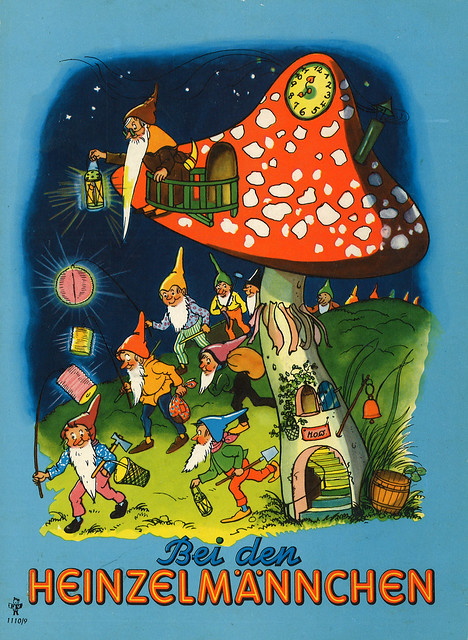Excerpt
from “Die Heinzelmännchen”:
How
comfortable it used to be at Cölln
With the Heinzelmännchen there!
If one was lazy
One just rested on a bench and took it easy.
They came by night before one even thought about it:
The little men - and they swarmed
And clapped, made noise, and plucked and pulled,
And hopped and trotted, polished and scraped.
And before a lazy fellow woke up
His entire day's work was done.
With the Heinzelmännchen there!
If one was lazy
One just rested on a bench and took it easy.
They came by night before one even thought about it:
The little men - and they swarmed
And clapped, made noise, and plucked and pulled,
And hopped and trotted, polished and scraped.
And before a lazy fellow woke up
His entire day's work was done.
------------
Nobody
wants to get their work done. Or better yet, no one wants to have to do work in
the first place. For us now, that might mean we procrastinate on homework, we
stay in the pool until we look like prunes, and we complain. Another way to go
about not doing your work is to make stories of how you wished someone else
would do the work for you.
It is not too much of a surprise
that people back in the 19th century took part in that sort of activity. No one
wanted work then either!
A popular myth within Germanic
history is that of the Heinzelmännchen.
The Heinzelmännchen were a race of small house gnomes. The idea is similar to
that of many others, but while a tailor sleeps, the Heinzelmännchen will come and finish his work for
him. Then, when he wakes up, there will be finished work and he can be permitted
to be lazy. This is shown in the excerpt above. However, the tailor’s wife gets
frustrated with this and scatters peas around, to annoy the Heinzelmännchen. They do get frustrated and they never come again!
Curious
was the tailor's wife
And found herself a way to pass the time:
She scattered some peas the next night.
The Heinzelmännchen came cautiously:
One tripped, fell down in the house,
They slipped down the steps
And plopped into vats!
They fell with a bang,
They hollered and screamed and cursed!
She jumped at the noise with a light:
Husch, husch, husch - they all vanished!
And found herself a way to pass the time:
She scattered some peas the next night.
The Heinzelmännchen came cautiously:
One tripped, fell down in the house,
They slipped down the steps
And plopped into vats!
They fell with a bang,
They hollered and screamed and cursed!
She jumped at the noise with a light:
Husch, husch, husch - they all vanished!
This was written in 19th century Germany at the
same time as the industrial revolution (which Germany was very involved and
powerful in). A big part of the industrial revolution was this advancement in
technology where we start using machines and more complicated structures to
finish our work instead of simple tools and our own hands. A thought that came
to mind when realizing this was that there was as new work dynamic coming into
play at this point in time (mid 1700’s to mid 1800’s). There is this idea
coming more into play of there being less work for an individual than before.
There’s an easier way to get many things finished. What if the myth of the Heinzelmännchen could be a bit in
response to the idea of other things doing work for us?
Of course, there are
similar stories to this that were written long before the industrial
revolution, but it’d be interesting if the writing of it was indeed, in
response to the idea of an easier way of life.
It seems to be a human
quality to put off many things that we’re supposed to do, but just won’t. We’re
such a sensitive species where we’re incredibly picky about what we want to do!
And these sorts of stories are so common across the world that it shows how we’re
all united…in creatively complaining!
If you’re interested,
here’s a link to the full (translated) version of the poem that the Heinzelmännchen
were originally mentioned in:

Ian/19cMonsters, this makes me wonder why anyone would *want* to stop someone from doing your work overnight. Your post brings up another issue about Frankenstein: of all the reactions that Victor had to his creation, making some kind of servant out of him or forcing him to work doesn't seem to have been one of them--unlike, say, fiction or movies with robots.
ReplyDelete